
Within a few minutes of meeting, Jack Mulhern has taken it upon himself to tell me about his favourite parts of Central Park as we choose where in the park to take photos in, sincerely explaining to me how an Ancient Egyptian obelisk (which I later learn is called Cleopatra’s Needle) came to end up being put on display near the Metropolitan Museum Of Art. Three of these obelisks exist in the world, with the other two stationed in London and Paris, and Mulhern later questions whether colonisation makes their location problematic - and it’s this ongoing questioning of the world around him that gives Mulhern such a unique view of the world.
Known for his portrayal of Grizz in Netflix’s ‘The Society’ (which has just recently been renewed for a second season), Mulhern has been overwhelmed with the love he’s received for his acting, and is enthused about the opportunity to continue to tell this story.
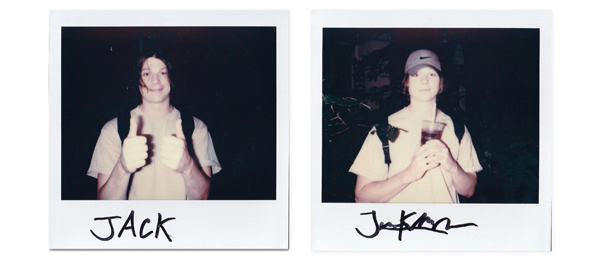
Moments after finding a new spot for photos, we find ourselves unrooted and seeking shelter after an unexpected thunderstorm wreaks havoc on the park, and relocate to the nearby Carlyle Hotel, where we sit down to discuss Mulhern’s philosophies on life, as well as the upcoming second season of ‘The Society’, and how the show reflects and questions our own morality…
Interest in philosophy, definitely, and interest in the natural world and sustainable agriculture - that’s something that I definitely share with Grizz. I think he’s a lot more stoic than I am, principled and virtuous, naturally speaking, not in any kind of a pretentious way, I think I’m a bit more of a cold person than he is. It’s cool, I aspire to be like him, I think he’s an aspirational figure precisely because he doesn’t think of himself as being terribly virtuous or important in any way. He just kind of behaves in such a way that ends up shaking out for the good, which is an incredible thing - people that are accidentally virtuous are ones to keep an eye on.
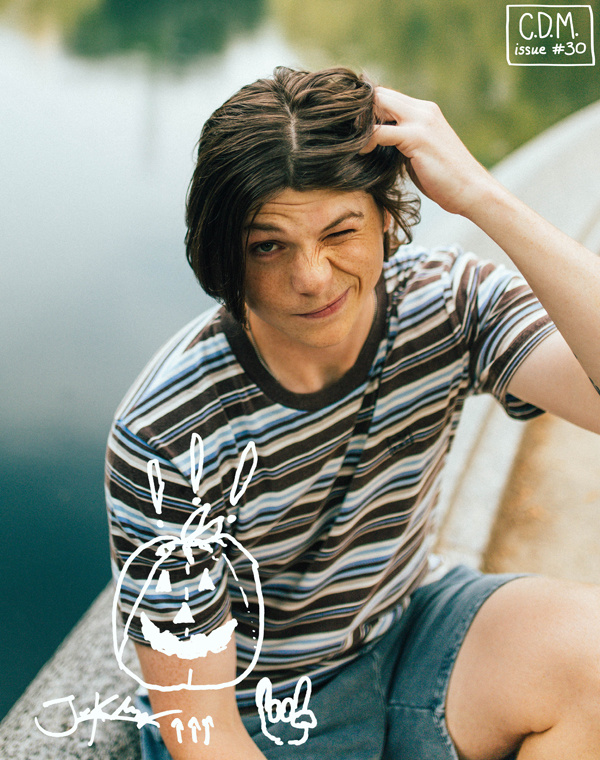
[Absent Washed Up Stripe T-Shirt, Absent Indigo Dyed Track Short by Hallensteins. Shoes, Jack's own.]
COUP DE MAIN: Congratulations on ‘The Society’ being renewed! When we last spoke on the phone I know you guys were waiting to see how the analytics were doing, so it must have been exciting to share that news with everyone!
JACK MULHERN: Yeah, super exciting!
CDM: What do you know about the second season so far? Has the show shared anything with you so far in preparation for it?
JACK: Not the specifics. I know a little bit about where we’re going - I know it’s going to be kind of a flip of the political structure from the first season, with offsetting a lot of the labour to a second-class that’s being created - I think, I’m not sure. As far as the ins and outs of where it’s going to go and what kind of conflicts there’ll be, I have no idea.
CDM: What do you want Grizz to explore in future seasons of ‘The Society’?
JACK: I think, I’d like things to happen, let’s say. Grizz is poised in this situation to be a sort of begrudging voice against injustice, and in this division in the community, now he’s in charge of this labour division. Needless to say, the two parties, the political head, and the labour division that is fuelling the society so to speak, are at odds with each other - philosophically; not to be funny. I think I would like to see him put in more situations like the expedition, more survival scenarios, I think hunting should become part of the show. I think they have a pretty crazy arc for the second season planned, so I’m excited to see what they come up with.
CDM: I personally am hoping for a spin-off based around him in the wilderness, kinda like Bear Grylls.
JACK: Yeah, right exactly! That would be cool.
CDM: Do you think your first filming experience for ‘Lock and Key’ was good practice for ‘The Society’, even though it never actually came out?
JACK: Yes and no. Like, all experience is good experience for me, so that show was wild in more ways than one, just because it was far away from home, it was the first thing I’d ever done, there were stunt-heavy sections and things like that.
CDM: Were you doing your own stunts?
JACK: No! I thought about it, but I was so green that I had no idea what to ask. I guess maybe that’s the difference, maybe I was so nervous and flabbergasted that it happened, because it happened so suddenly, that I was afraid, or I didn’t know the boundaries of what to ask for and didn’t have a frame of reference for how other people approached it. Working on the show, and then I think since then, I’ve learned a bit more how to carve out your own space on set, on any given day, and when you have to approach a certain type of scene and how to navigate a set to feel comfortable on any given day. We were working on it for like four months, so it was a really big ‘hit the ground running’ in terms of getting comfortable on set, and also because the temptation can be when you’re working - in a positive way, it’s a very blue-collar environment, you clock in, you go to lunch, and then you punch out at the end of the day - to make it and not to be disillusioned, but to make it a job. I think the fun thing is if you take a lot of the creativity from doing stage work, and you meet the professionalism of being in a working film set, and mash the two together somewhere in the middle, I think that’s where you find control as being a performer. So that was a huge learning process.
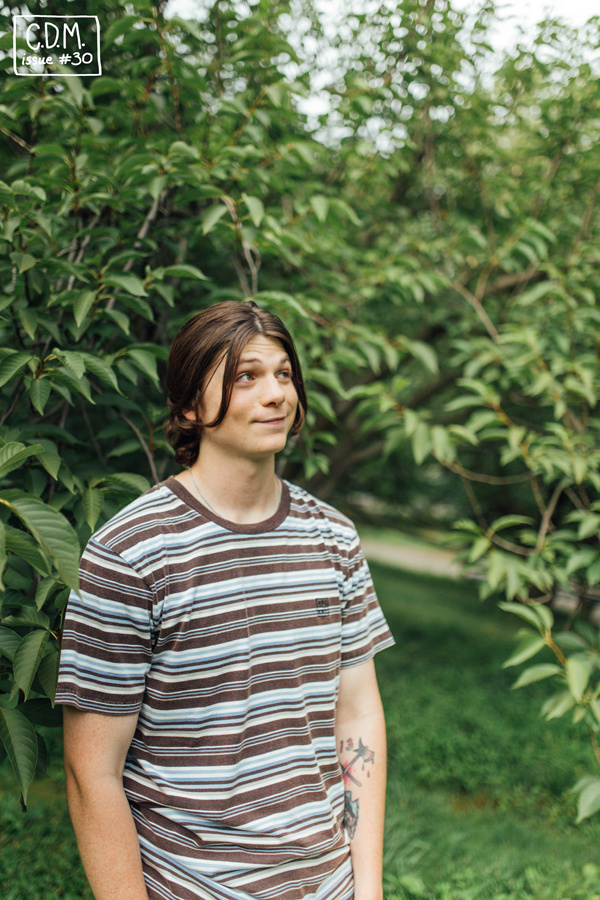
CDM: It’s cool to see so many Australians were in ‘The Society!’ What was it like working with Alex Fitzalan and Toby Wallace?
JACK: They are riotously funny. They are wild. They also happen to be very talented and very professional. Everybody had a fantastic time. I don’t want to say it’s an unprecedented thing, but it’s a very atypical thing I think to have a cast entirely composed of people that are in your age group, and there’s about 15-20 of you. They literally stuck a bunch of kids in the woods and said make a TV show. Needless to say, we ended up having a fantastic time. [Alex] Fitz and Toby lived in this ridiculous house - everybody else lived in apartment-style living, so whenever there was a bash it would always be at theirs and it was always a lot of fun. I love those guys, they’re great.
CDM: What were your first impressions of your fellow cast-mates when you first met them?
JACK: Well, I was a bit nervous. I’m not the most extroverted or effusive person, especially in situations where there are a lot of unknown variables, so I picked the perfect profession for someone in that disposition. <laughs> So I was just nervous if I was going to get along with everybody; if everybody was going to be welcoming, and so I came in with my head down, a bit shy and trying to do the best job I could. I think to my great surprise, everybody turned out to be fantastic and accommodating, and really kind, really funny, and multi-variable. There was chess on set, there was reading philosophy with José [Julián] on the weekends in Cambridge, everybody was super supportive and creative, Jacques [Colimon] was making music all the time - it ended up being this multi-layered and incredible experience. They defied all my expectations of the whole project and what I thought it was going to be.
CDM: In your interview with L'Odet you said that the show is about: "How we design, interact, and create the greatest good between all of us. The most cohesive system for us to live. And it's about — if we start from square one, with kids — if they'll repeat the same mistakes that previous generations have. If the same social ills and violence, the same kind of segregation, and all of that will repeat itself with these kids." That kind of ‘history repeating itself’ is such an interesting concept, that we’re seeing play out in the real world today - so it’s interesting to see the show live in this alternative reality, but also shed light about what’s happening in real life.
JACK: It’s purposeful. Chris [Geyser, show creator] was first pitching the show a while back, so the fact that they started making it when they did is seemingly more than coincidental, it’s very timely. I mean, that’s the most interesting thing. It’s also cool, the audience, there’s a wide diaspora - there are these young, cult fans, and then people my folks' age stop me on the street sometimes, and I’m sure for them it’s interesting to watch a political melodrama play out with kids - any kind of ideological failing, when kids are killing each other, I don’t know if guilt or shame is the word, of course, it’s fictional, but it might shine a brighter light on people’s systemic moral failings.
CDM: I feel like people are more willing to accept through TV shows a reflection of their society, rather than seeing a documentary or play-by-play of reality.
JACK: Yeah, I mean that’s the job, right? That’s what I do. Following the logic. I don’t know if it would end up with such a hierarchical structure so quickly in ‘real-life’, but I think that’s the interesting thing about people repeating patterns and things like that, is it becomes some kind of a super-structure and an ordering principle, it becomes necessary if you follow the logic of, ‘what I would do in the situation.’ So really it’s not out of bounds of the creative world to be exploring these questions, it doesn’t feel ham-handed, it feels like it’s central to the idea.
CDM: If you, Jack, were in a situation like ‘The Society’, what type of approach do you think you would take?
JACK: I think it would be somewhere in between. It wouldn’t be as extreme as hiking off and becoming a hermit in the middle of nowhere, because I don’t know if I’m as skilled as Grizz is. I think it might be a failure to launch in terms of me starting my own commune in the middle of the woods, but I’m more of an introverted sort of isolationist personality, so I think I’d be very sceptical of people’s intentions and plans, and the communal vibe. As soon as anything went sour, I’m like an ostrich with my head in the sand, so I think I would split. Somewhere in between complete isolation and complete on my own, and then with an ear to the streets and keeping in with the group politics and seeing what everybody else is coming up with too.
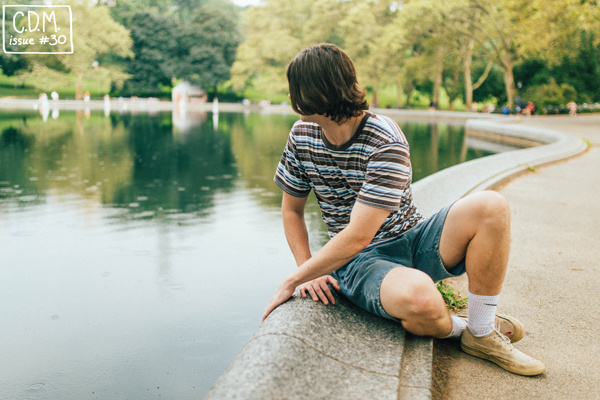
CDM: In what ways do you think that you’re similar to your character Grizz?
JACK: Interest in philosophy, definitely, and interest in the natural world and sustainable agriculture - that’s something that I definitely share with Grizz. I think he’s a lot more stoic than I am, principled and virtuous, naturally speaking, not in any kind of a pretentious way, I think I’m a bit more of a cold person than he is. It’s cool, I aspire to be like him, I think he’s an aspirational figure precisely because he doesn’t think of himself as being terribly virtuous or important in any way. He just kind of behaves in such a way that ends up shaking out for the good, which is an incredible thing - people that are accidentally virtuous are ones to keep an eye on.
CDM: What first caught your eye for ‘The Society’ script when you first found out about the show?
JACK: The situation. The potential for the situation to evolve over a number of years. Especially on a TV show, the cool thing is that if you’re lucky, you get to stay with someone for a while. For an actor, people want to have an experience, that’s what they sign up for, not just with the circumstances of the show, but with the character. If you play someone for years and years, inevitably the person will deepen, and I think that’s a really great master class in character work, especially if you’re really going for it. So it was a cool idea for me, being thrown in these circumstances and watching people change over a number of years. I thought it was an exciting opportunity. So if we do get to go a number of years, I think it’ll be incredible to watch these people change, and that’s the coolest part.
CDM: How do you think people can create the greatest good in the world we live in today?
JACK: That’s a tough question. I am of the opinion that morality is not something that you cultivate in individuals, it’s experiential. It’s like an objective natural phenomenon, like the ocean, or one of the oceans, or the forest. It’s something that you attune yourself to, rather than act in the vein of. I think that human justice is imitative of universal justice and universal law. I do believe in sort of an objective metaphysical superstructure, I’m not really keen on the post-modern ideology that everything is subjective and that all existing bodies of knowledge can be cast-off as being products of social hierarchies and invented social structures. I’m not really into the whole cultural relativism thing, there has to be a belief in an objective truth, or an objective morality, we can at least agree that there are preferable treatments of other people as opposed to others, and that in and of itself is an objective fact. I think that morality is not an aspect of reality, I think it is reality, it’s the fundamental building block of everything, it’s sewn into the fabric of everything. So it’s inherently metaphysical, is my understanding of it, and in the West, the occidental thinking is built on a Judeo-Christian foundation, which is inherently shame-ridden and guilt-ridden, and you hold the crux of morality on your shoulders every day, you have to self-flagellate through your whole life and live in shame and guilt. But if you adjust to maybe this idea, it alleviates so much of the burden, like, ‘I’m not responsible for the moral superstructure of the world.’
CDM: I feel like people put a lot of pressure on themselves.
JACK: Yeah, totally. I grew up and went to Catholic school from kindergarten through to fifth grade. Growing up, there were a few Evangelical families in town; parents of friends of mine, and when 9/11 happened, it sort of sharply divided the community. Suddenly a maelstrom of politics and ideologies were being thrown at kids - I was in the first grade when that happened, and suddenly if they hadn’t been before, your religious beliefs were thrown directly into the party line. There would be kids having inarticulate screaming matches in lunchrooms in grade school over the war in Iraq. You’d be going to friend's houses, and because your parents were leaning one way or another politically, I’d go to a friend's house who had Evangelical parents and they would be outright rude to me because of the sentiments seemingly demonstrated by my parents in a small town.
CDM: I always find it interesting when children end up inheriting their parents’ belief systems initially - in New Zealand, a lot of politics is dictated by who your parents vote for.
JACK: Also that when you’re a kid, you look up to adults as sort of these paragons of virtue, like, ‘They know what’s going on, if I just do what they’re doing, I’ll be okay.’ And when adults talk down to you and are openly rude and mean to you and dismissive to you as a child, because of their belief structure, you come at odds with the belief structure. So it’s been a long way around the barn, talking about morality, figuring out where that lives and how I relate to it, just from having experienced it from such a young age.
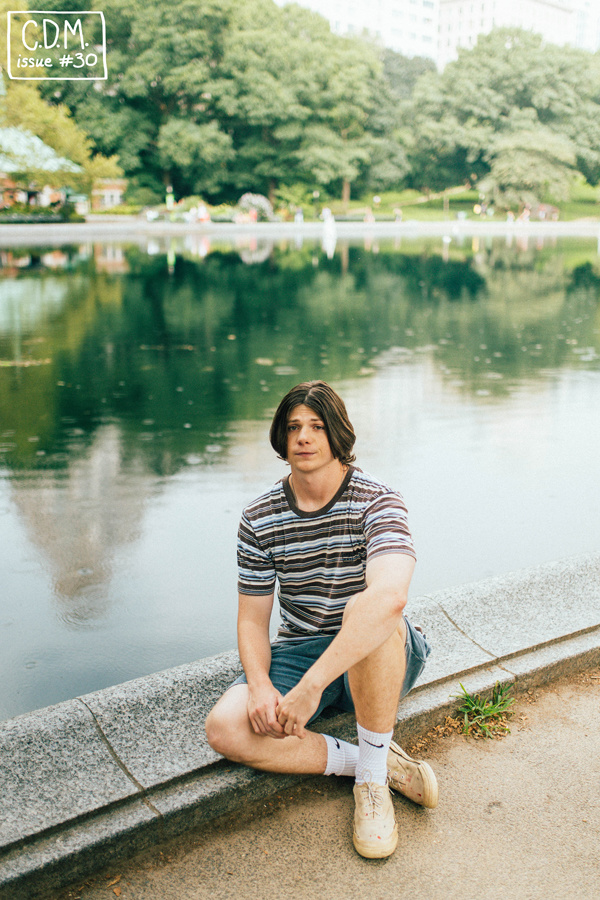
CDM: Do you think that a person’s beliefs are always changing throughout their life?
JACK: Yeah. You ask anybody, “Do you feel the same as you did two years ago?” Normally people, like my folks, they would argue tooth and nail that they have more perspective than they did twenty years ago on all topics. I don’t think that it means that at any stage along the journey you are more naive, you’re just where you’re at. It doesn’t have to be a scaremongering thing, like, “You don’t know.” We live in a more connected world than has ever existed, so you have all of human history to learn from throughout your life, so I would say that it’s changing and hopefully changing for the better, as long as you go along the journey. I’m excited about proving myself wrong. It’s tough too, because when you’re young, and I do it too, there’s so much information being blasted at you that you can sometimes state a bunch of received opinions that you don’t have an intellectual roadmap to reach the conclusions, you just kind of blurt things out because they remind you of other demagogues or figureheads - people that have said these things, these empty life statements, only empty because you don’t have the background to fill it out. That’s the thing too, to parse your speech, and to try your best and say what’s true for you, at any given moment.
CDM: What do you think are the biggest issues facing our society today?
JACK: I mean, I’m a human being, so I’m not a fan of bigotry and hatred spewing out, I think that that’s non-productive as a baseline. I don’t know if I’m going to uphold the thing that I talked about before, that morality is not cultivated, it’s experiential - then I think that we as human beings, we’re not the pencil-point on the tip of creation so to speak, that the elevation of the burden of thinking that way is if you accept as a premise that you live in a moral universe, that things will follow a kind of necessary hermeneutic cycle of creation and destruction. Is there a lot of terrible shit going on right now? Yeah, super. But I don’t know if it can be compared to the ills of the 20th Century, but like anything past, I think that it’s a necessary growing pain.
CDM: I feel like our generation have grown up thinking they can’t make change in the world, but ultimately it’s people like Greta Thunberg who are actually creating change in the world. Do you think it’s important that young people believe that they can effect change?
JACK: Definitely, I’m an individualist. I think that people have to take accountability for themselves. That’s a big thing, and it’s not like I’m above it too - I’ve fallen in the same trap as well of thinking, ‘I’m a kid,’ and using that as an escape route for some of my decision making, or not getting off my ass and acting on my beliefs, so to speak. I think that for me, I notice that the more I clean up my own act and crystallise my own beliefs, the more feasible it becomes to act on those - the more opportunities present themselves in very tangible ways to feel like you’re contributing. So I think people are individually culpable and I think that especially my generation, we’re not kids anymore.
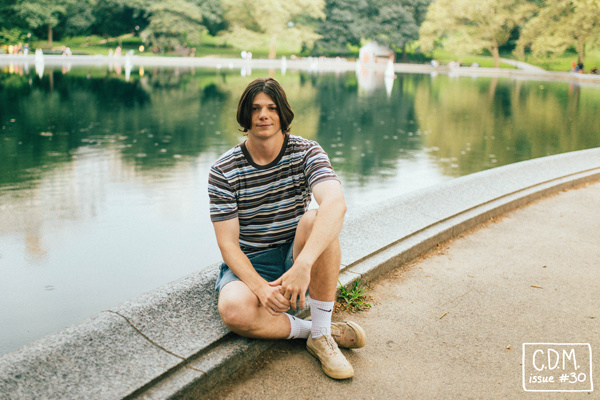
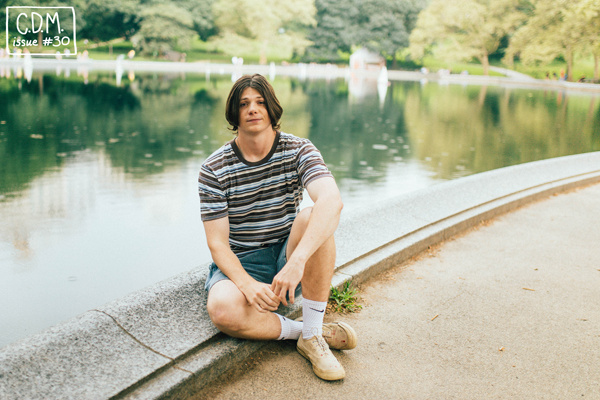
CDM: Your Dad was an actor, right? Do you think that made you inherently interested in acting/performing?
JACK: My mom was an actor too, that’s how they met, through a play in New York. I don’t want to say that they told me not to do it, but my parents are pragmatic people. They were encouraging insofar as I showed interest, but they certainly didn’t push me in any one direction. I kind of swore it off, because it’s a tough as nails thing to be a working actor, and my dad was a working actor for thirty years, I think he hung up his spurs as soon as I got involved. So I swore it off when I was a kid and I didn’t really start again until I was 21. That was sort of just because I had a flirtation with a bunch of mental health issues, and it made it very clear cut that I had to find a dream, so to speak. All I would talk about was film, so a buddy of mine said, “Why don’t you study it?” I was like, “No, real actors don’t study acting, they work on their craft,” and he was like, “I don’t see the problem with you studying it.” So I mulled it over, and I couldn’t find a reason why I shouldn’t do it, so the decision to study it improved the quality of my life very much, and I just kind of rolled off of the excitement and the passion into a professional career.
CDM: It’s cool how it came about when you were searching for something.
JACK: Yeah, and you know what’s really cool? This is a weird phenomenon. If you’ve ever found yourself in a situation where you’re so low, with mental health or anything like that, and no doors are opening for you, it’s the complete absence of interest. Not just in hobbies or passions or ambitions, but people, the day, and the surroundings - you can stare at a wall or go into a fog, and fifteen hours will have gone by. But then, weirdly enough, and I think the reason why I realised it is because it was such a stark contrast, it happened so quickly, and my life changed so quickly once I made one right decision. If you become passionate about something, it’s like everything that you’ve ever been passionate about in your life comes out the woodwork again - almost like it’s one thing. Interest and passion, they have many pockets - through your area of interest, you’re experiencing interest or passion. Passion causes all of the different little pockets through which it manifests itself. I remember, before that I had one of many crises when I was like, ‘I don’t care about anything. I can’t do anything. I have no hobbies or interests.’ Then after things started going well and I was passionate about things, suddenly I couldn’t get enough of agriculture, woodworking, writing, travelling, photography, filmmaking - everything kind of came at once.
CDM: What do you think is the difference between a good actor and a great actor?
JACK: That’s a good question. I think that a lot of it is out of your control, sort of like the instrument you are playing with - your intuitive principal, and that’s a big thing, your openness and spontaneity. I think as you get involved in it more and more you start to realise that it’s something ineffable. It’s your charisma, and the way you hold yourself that makes you compelling to watch - all of that is completely out of your control. But I would say that the division between good and great, is the great ones are incredibly hard-working and they’re willing to take onus of, say for film acting, of a film environment in the way that others are not. They’re not jaded or disillusioned, and this is a job; they treat it almost as a play. They come at it with preparation, with a full imaginative world built with research and a willingness to approach work with a seriousness which might rub people the wrong way, but the commitment alone brings you to an emotional place and a nuance that you couldn’t reach if you were just skimming it on the surface. I think that if somebody wants to become a great actor they should aspire to work on their craft every day - researching other people, following people on the street, reading all the greats, working technique, and using every single job as an opportunity to try and get closer to that ideal of the work that they strive for. We’re not there yet, but I’m working my ass off.
CDM: Is there any particular reason that Halloween is your favourite holiday?
JACK: Since I was a kid I’ve always loved the holiday. But all my favourite films are 'Evil Dead II', 'Throne Of Blood', I love Henry Selick, Tim Burton, all of that stuff. I don’t know exactly what it is about it, I just kind of like the iconography and the fantasticalness about it. I also have this thing about Tim Burton too - people tell you all the time to become more homogenous, to model yourself in order to seek out opportunities, but Tim Burton strikes me as the complete opposite version of that, a guy who went so inward, fell back so hard on his own creative principles and his own vision that the world seemingly came to him. So that’s always been really exciting to me, and something that I would like to model - in the things that I make, not necessarily in the acting work, but in the writing and the directing, he’s definitely a standout influence for sure.
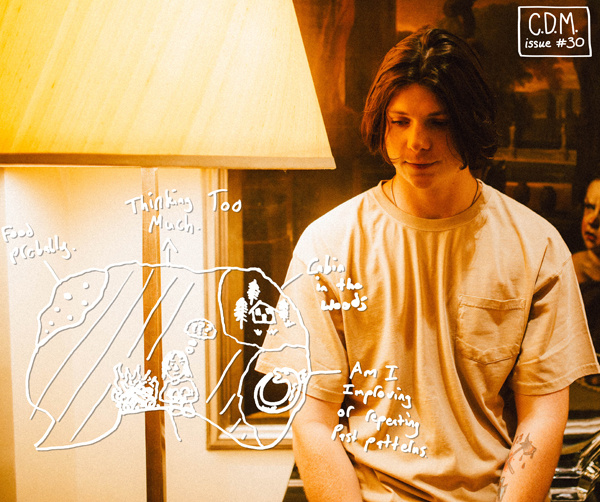
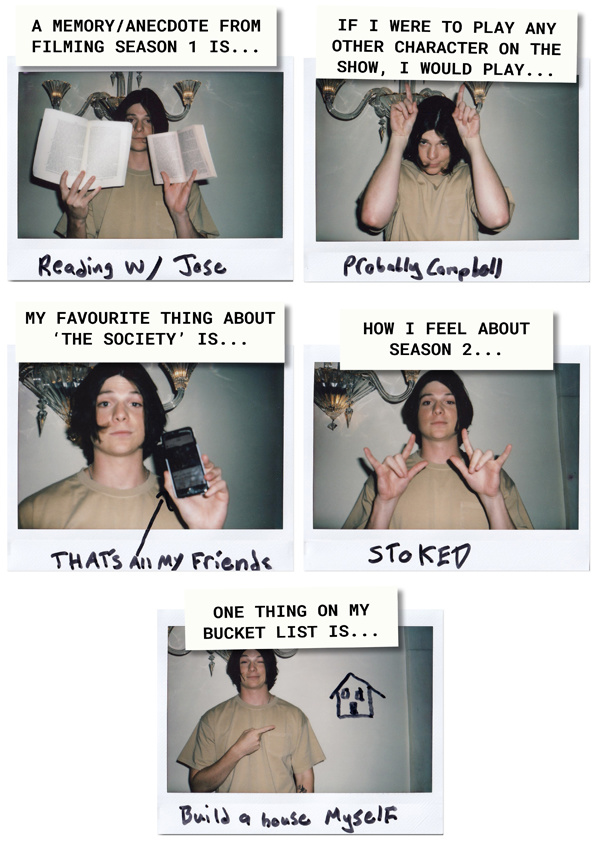
PHOTOGRAPHY BY SAM KEELER
GROOMING BY CLARISSA LUNA FOR CROSBY CARTER MGMT
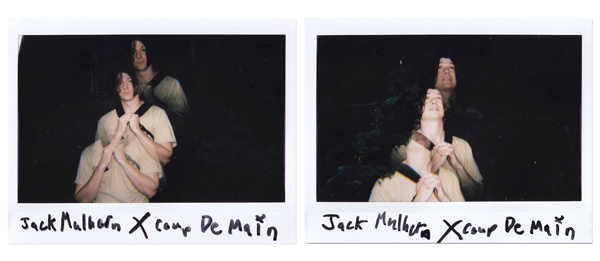
‘The Society’ Season 1 is airing now on Netflix - watch the trailer below:

